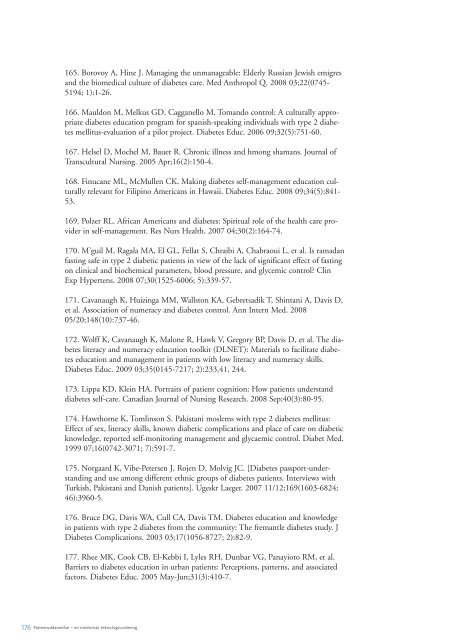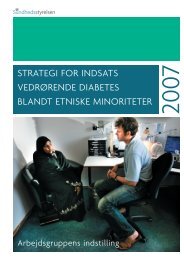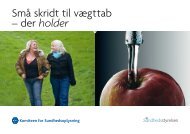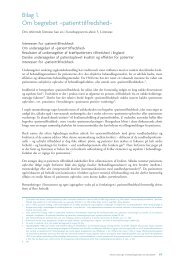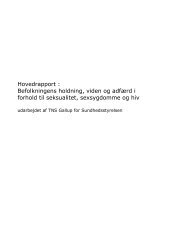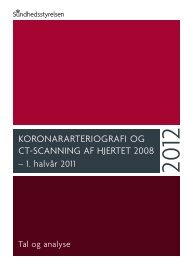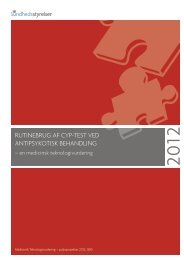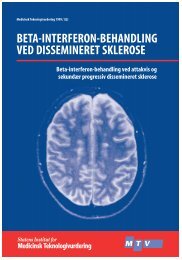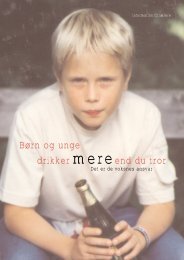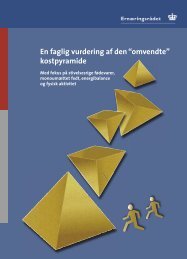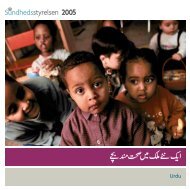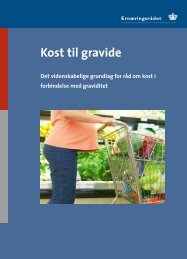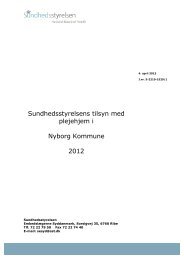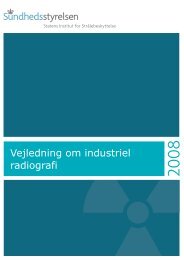Patientuddannelse - Sundhedsstyrelsen
Patientuddannelse - Sundhedsstyrelsen
Patientuddannelse - Sundhedsstyrelsen
Create successful ePaper yourself
Turn your PDF publications into a flip-book with our unique Google optimized e-Paper software.
165. Borovoy A, Hine J. Managing the unmanageable: Elderly Russian Jewish emigres<br />
and the biomedical culture of diabetes care. Med Anthropol Q. 2008 03;22(0745-<br />
5194; 1):1-26.<br />
166. Mauldon M, Melkus GD, Cagganello M. Tomando control: A culturally appropriate<br />
diabetes education program for spanish-speaking individuals with type 2 diabetes<br />
mellitus-evaluation of a pilot project. Diabetes Educ. 2006 09;32(5):751-60.<br />
167. Helsel D, Mochel M, Bauer R. Chronic illness and hmong shamans. Journal of<br />
Transcultural Nursing. 2005 Apr;16(2):150-4.<br />
168. Finucane ML, McMullen CK. Making diabetes self-management education culturally<br />
relevant for Filipino Americans in Hawaii. Diabetes Educ. 2008 09;34(5):841-<br />
53.<br />
169. Polzer RL. African Americans and diabetes: Spiritual role of the health care provider<br />
in self-management. Res Nurs Health. 2007 04;30(2):164-74.<br />
170. M’guil M, Ragala MA, El GL, Fellat S, Chraibi A, Chabraoui L, et al. Is ramadan<br />
fasting safe in type 2 diabetic patients in view of the lack of significant effect of fasting<br />
on clinical and biochemical parameters, blood pressure, and glycemic control? Clin<br />
Exp Hypertens. 2008 07;30(1525-6006; 5):339-57.<br />
171. Cavanaugh K, Huizinga MM, Wallston KA, Gebretsadik T, Shintani A, Davis D,<br />
et al. Association of numeracy and diabetes control. Ann Intern Med. 2008<br />
05/20;148(10):737-46.<br />
172. Wolff K, Cavanaugh K, Malone R, Hawk V, Gregory BP, Davis D, et al. The diabetes<br />
literacy and numeracy education toolkit (DLNET): Materials to facilitate diabetes<br />
education and management in patients with low literacy and numeracy skills.<br />
Diabetes Educ. 2009 03;35(0145-7217; 2):233,41, 244.<br />
173. Lippa KD, Klein HA. Portraits of patient cognition: How patients understand<br />
diabetes self-care. Canadian Journal of Nursing Research. 2008 Sep;40(3):80-95.<br />
174. Hawthorne K, Tomlinson S. Pakistani moslems with type 2 diabetes mellitus:<br />
Effect of sex, literacy skills, known diabetic complications and place of care on diabetic<br />
knowledge, reported self-monitoring management and glycaemic control. Diabet Med.<br />
1999 07;16(0742-3071; 7):591-7.<br />
175. Norgaard K, Vibe-Petersen J, Rojen D, Molvig JC. [Diabetes passport-understanding<br />
and use among different ethnic groups of diabetes patients. Interviews with<br />
Turkish, Pakistani and Danish patients]. Ugeskr Laeger. 2007 11/12;169(1603-6824;<br />
46):3960-5.<br />
176. Bruce DG, Davis WA, Cull CA, Davis TM. Diabetes education and knowledge<br />
in patients with type 2 diabetes from the community: The fremantle diabetes study. J<br />
Diabetes Complications. 2003 03;17(1056-8727; 2):82-9.<br />
177. Rhee MK, Cook CB, El-Kebbi I, Lyles RH, Dunbar VG, Panayioto RM, et al.<br />
Barriers to diabetes education in urban patients: Perceptions, patterns, and associated<br />
factors. Diabetes Educ. 2005 May-Jun;31(3):410-7.<br />
176 <strong>Patientuddannelse</strong> – en medicinsk teknologivurdering


